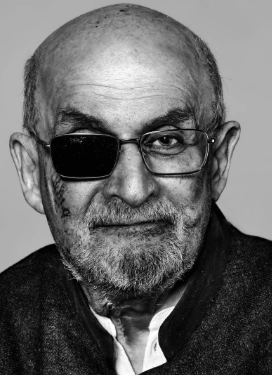Here is how Rushdie summarizes the plot of his novel, Fury:
Malik Solanka, historian of ideas and world-famous dollmaker, steps out of his life one day, abandons his family in London without a word of explanation, and flees for New York. There’s a fury within him, and he fears he has become dangerous to those he loves. He arrives in New York at a time of unprecedented plenty, in the highest hour of America’s wealth and power, seeking to “erase” himself.
While in New York he is hit by the feeling that the world is changing "advancing" in ways beyond his ability to follow. He is being left behind. Is this not the feeling of huge numbers of Americans today? Are there not the thoughts of Trump's benighted followers? Here is how Rushdie's character, Solanka puts it:
Now that Solanka knew that someone somewhere knew what he would never know, and was additionally quite aware that what was known was vitally important to know, he felt the dull irritation, the slow anger of the fool. He felt like a drone, or a worker ant. He felt like one of the shuffling thousands in the old movies of Chaplin and Fritz Lang, the faceless ones doomed to break their bodies on society's wheel while knowledge exercised power over them from on high. The new age had new emperors and he would be their slave."
David Remnick in his recent article in the New Yorker "The Defiance of Salman Rushdie" bifurcates the novel into two streams:
Rushdie takes from Milan Kundera the idea that the history of the modern novel came from two distinct eighteenth-century streams, the realism of Samuel Richardson’s “Clarissa” and the strangeness and irrealism of Laurence Sterne’s “Tristram Shandy”; Rushdie gravitated to the latter, more fantastical, less populated tradition.
Big Frank is reading Sterne's "Tristram Shandy" while he reads Rushdie's "Fury," but has since discovered that it is "Midnight's Children" where Rushdie most closely follows Sterne's "strangeness and irrealism." Big Frank first bumped into that novel back in 1982, when a fresh new graduate from Oxford came to Krakow to teach for the British Council and in his baggage he carried a much thumbed copy of Rushdie's "Midnight's Children." That was forty years ago! And Big Frank still has not read it! Ah, perhaps tomorrow!
At first it is quite upsetting to try to settle into a normal chronological flow with Sterne. Then after accepting that he will us unending digressions, stories embedded within stories, unending interruptions, just to name a few narrative devices, Big Frank woke to the modern novel - born in the 18th century with Sterne. Rushdie embraced Sterne as well, and after Fury Big Frank will finally pick up Midnight's Children.





